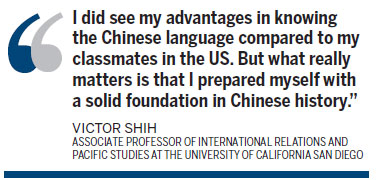
|
Victor Shih is associate professor of International Relations and Pacific Studies at the University of California San Diego and author of many books. Provided to China Daily |
Victor Shih always had a knack for what makes China tick.
Shih, an associate professor of International Relations and Pacific Studies at the University of California San Diego and the author of many books, sees China as naturally divided into factions. According to him, such factions play a vital role in China's economy.
Shih moved with his family to the US from Hong Kong in 1986. His parents, being teachers, and his grandparents influenced him to read and think since he was a boy.
"I have read all Chinese books about histories in Hong Kong before I entered middle school in the US," Shih said. "I did see my advantages in knowing the Chinese language compared to my classmates in the US. But what really matters is that I prepared myself with a solid foundation in Chinese history."

Shih got high marks in economics and politics during his undergraduate days at George Washington University in Washington. Shortly before his graduation, his professor told him he should consider a PhD program. Shih followed his advice and eventually got accepted to Harvard University.
Guided by Roderick Mac Farquhar, then chairman of the Department of Government at Harvard and formerly director of the John King Fairbank Center for East Asian Research, Shih was inspired to pursue his main interest in Chinese politics - factions in Chinese political history and "cultural revolution" (1966-76). Shih also focused on the link between elite politicians and banking policies in China.
His doctoral dissertation, also his first book - Factions and Finance in China: Elite Conflict and Inflation- was published in 2008. The book examined the Chinese banking sector.
"There was no existing framework with which to analyze the links between banking and politics," he said. "I did lots of interviews, statistical analysis and archival research."

The book is considered by some the first in academia to develop a framework with which to analyze how elite politics affect monetary and banking policies.
Scholars review this book as a clear, well-researched explanation of the dynamic driving China's reforms.
"It is both a fascinating portrait of elite politics in China and a rigorous test of an analytical model," said Bruce Dickson, political science professor and director of Asian studies at George Washington University. "Most scholars are good at one approach or the other. Shih shows he is equally gifted at both."
Shih began his study of China's capital markets in 2009. His findings on China's local government debt were published in China Economic Review in 2010, creating a stir in the US and China. He noted in the thesis that combining the findings of the National Audit Office (NAO), the China Banking Regulatory Commission (CBRC) and the People's Bank of China, the total official estimates of local governmental debt is much higher than the National Audit Office (NAO) said in its report.
"My estimate was entirely based on official numbers that the government announced to the public online," Shih said.
His study suggested that Chinese government must have the resolve to stop local-level leveraging before risks in the financial system steam out of control.
"I noticed that in recent years the Chinese government has taken many efforts to control the total amount of local debts," said Shih. "I also noticed that the Chinese government tends to be more transparent about the financial figures."
Shih said now People's Bank of China published the total debts of the entire country and he's able to observe the whole situation in China. "My intention is to answer such a question - how China's total debts affect China's rapidly growing economics?"
China has significant ability to control the economic fluctuations. Shih argued that "China needs to bring some financial risk to some degree.
"In financial markets, there have to be some failures," Shih said. "If your bonds are bad ones, your company shuts down. So people won't count on the government all the time as the final straw for bad business. Any market has risks.
"The only thing I see purely possibly run by a market economy is the so-called underground banking system, which is illegal in China."
Shih believes that the Chinese government will make more of an effort to balance the economy.
"Slowing down a bit is not bad, and sometimes needed," Shih said.
Shih turned to the business world in 2012 and 2013, running a company with some of his former colleagues and friends.
"It is a good experience that I got to stand in the real capital market; however, I ended up realizing that the academia world gives me the sense of real happiness and accomplishment," said Shih, who returned to teaching as an associate professor at the University of California-San Diego, his current profession.
cindyliu@chinadailyusa.com